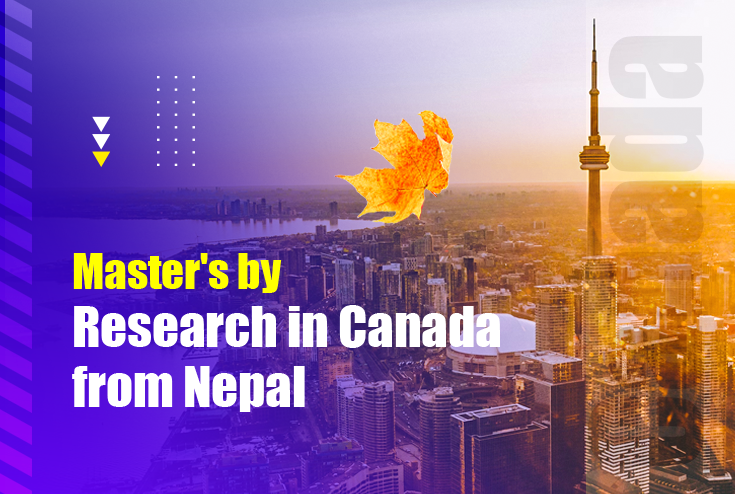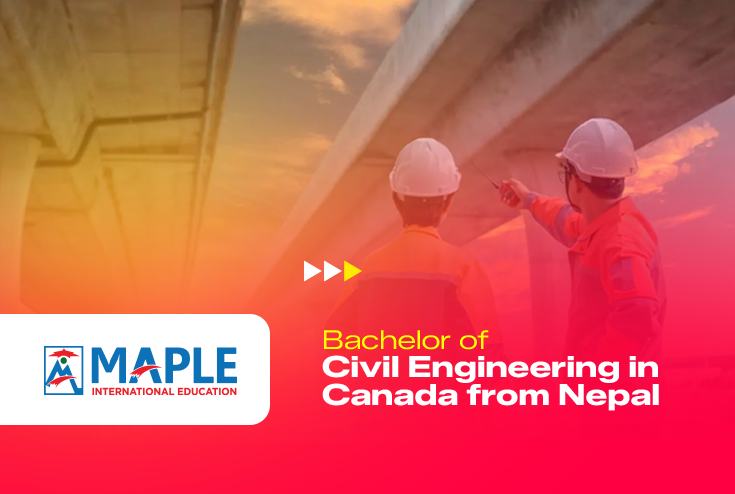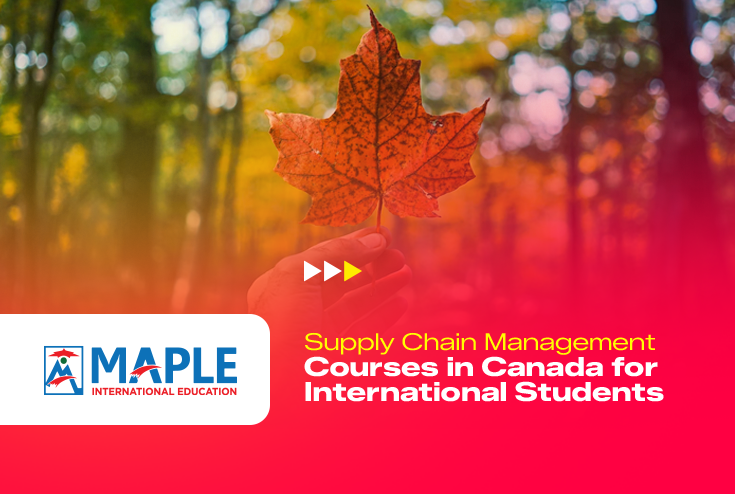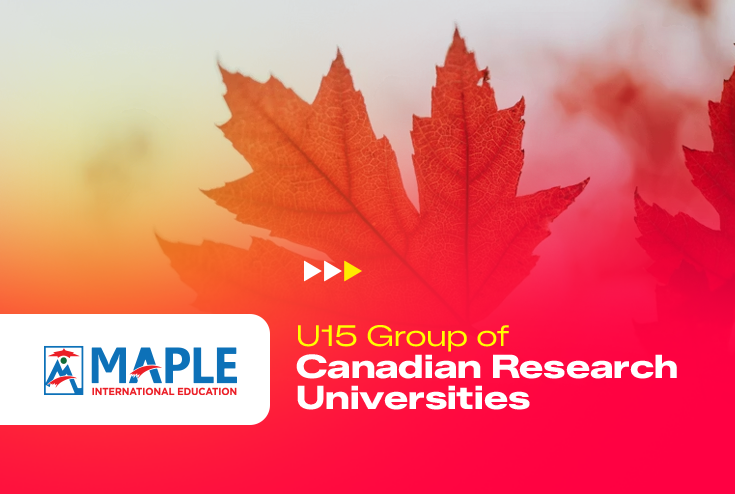
Masters by Research in Canada for Nepalese Students
If you enjoy deeply understanding a subject to gain advanced insights, or if you're confident in your research skills and want your work to be published and contribute to academic knowledge, then a Master’s by Research in Canada might be your ideal next step after a Bachelor’s from Nepal. Master’s of Research (or MRes) is also an excellent path if you’re planning to pursue a PhD or build a career in academia. And one of the best parts? You won’t be restricted by a fixed curriculum in this Master’s program.
How?
Explore this blog and learn the whats and hows of this research-based master’s programs in Canada, including eligibility, top universities, scholarships, and overall costs.Table of Contents
- What is a Master’s by Research (MRes)?
- What is the Difference between Other Masters and Master by Research in Canada?
- Benefits of a Master’s by Research in Canada
- Why Choose a Master’s by Research in Canada?
- Eligibility Requirements for Master’s by Research in Canada
- Academic Eligibility for Master’s by Research in Canada
- Language Requirements for Master’s in Canada
- Documents Required for a Canada Student Visa from Nepal
- Popular Research-Based Master’s Courses in Canada
- Best Universities in Canada for Master’s by Research
- Cost of Studying Master’s by Research in Canada
- Scholarships and Financial Aids for Nepali Students
- Government-Funded Scholarships for Master’s by Research in Canada
- University-Specific Scholarships for Master’s by Research in Canada
- How to Apply for a Master’s by Research in Canada from Nepal?
- Career Scope After a Master’s in Canada by Research
- Industries with the Highest Demand for Researchers Worldwide
- MRes Career and Average Annual Salary
- Part-Time Work While Studying MRes in Canada
- Master’s by Research in Canada with Dependents
- What is the MRes pathway to PhD?
- Final Takeaways
- Choose Maple for your MRes Degree in Canada
- Frequently Asked Questions - Master’s by Research in Canada from Nepal
What is a Master’s by Research (MRes)?
A Master’s by Research, or MRes degree, is a research-based master's in Canada. This is an advanced postgraduate degree that focuses on independent academic research rather than classroom-based learning. Unlike traditional course-based programs, this Master’s in Research in Canada allows students to conduct their original research under supervision. This encourages students to learn their specialised topics in depth while working on their thesis or dissertation.
The duration of a Master’s by Research (MRes) in Canada is 2 years by standard. However, certain research may require more time.
This type of program is ideal for students who plan to pursue a PhD, enter academia, or work in specialised research roles across industries like healthcare, technology, business, or environmental science.
What is the Difference between Other Masters and Master by Research in Canada?
A research-based master’s focuses on original research and thesis work under a faculty advisor. A course-based master’s is more structured around classroom learning and suits those aiming for jobs right after graduation. A professional master’s provides industry-relevant skills for careers in fields like business, engineering, or healthcare, with little or no research work.
In Canada, master's programs are broadly classified into three types. Understand each of them below:
1. Research/Thesis-Based Master’s
Focuses heavily on original research and research methodology, with some coursework
Students work closely with a faculty advisor
Ends with a substantial thesis submission and defense
Common in fields like science, engineering, and social sciences
Best for students aiming for a PhD or research career.
Duration: 2 years typically
2. Course-Based Master’s
Revolves around classroom lectures, coursework, assignments, and projects
Often completed in a shorter time frame (1–1.5 years)
Ideal for students aiming to enter the workforce immediately
Best for students seeking structured learning with straightforward, quicker graduation
Duration: 1-2 years
3. Professional Master’s Programs
Designed to provide practical skills and knowledge with a course-based approach
Common in fields like engineering, business, healthcare, and law
Focus is on career preparation rather than academic research
Best for those seeking specialised knowledge, industry-level employment and skill development
Duration: 1-2 years
Benefits of a Master’s by Research in Canada
A research-focused master's offers a number of academic and professional advantages:
Opportunity to specialize in a specific area of interest with in-depth research
Closer academic mentorship and supervision
Pathway to PhD programs in Canada or abroad
Competitive edge for research-intensive roles in industry and academia
Involvement in publications, conferences, and real-world research projects
Is Canada good for master's?
Absolutely! Canada is one of the top affordable options for Master’s program, especially for those aiming to grow academically and professionally in a global environment.
Why Choose a Master’s by Research in Canada?
Canada has become a preferred destination for higher education for Nepali students, and here’s why:
Globally ranked universities with a strong research ecosystem
Easily obtain a 2 to 4-year post-graduation work permit (PGWP)
Ample part-time job opportunities while studying (up to 20 hrs/week)
Dependent visa options for spouses and children
Availability of special reservation for Master’s study permit in 2025
Safe, diverse, and inclusive society
Eligibility Requirements for Master’s by Research in Canada
As a Nepali student, you have to complete your Bachelor’s degree in a relevant field with a minimum GPA of 3.0, fulfil English language proficiency requirements, and prepare all the essential admission and visa documents for your Canadian Master’s Degree.
Explore these requirements for your research-based Master’s degree in Canada:
Academic Eligibility for Master’s by Research in Canada
A recognized four-year bachelor’s degree (some three-year degrees may be accepted with additional qualifications)
Minimum GPA: 3.0 on a 4.0 scale (i.e. 65% to 70%), may vary by university
Research experience or a background in academic writing is preferred
Language Requirements for Master’s in Canada
IELTS: Overall 6.5 (no band less than 6.0)
TOEFL: 86–100 iBT, depending on institution
Documents Required for a Canada Student Visa from Nepal 2025
Academic / Professional Documents
Academic transcripts and certificates
Offer letter from a Designated Learning Institution (DLI)
Your latest CV
English proficiency test scores (IELTS/TOEFL)
GMAT or GRE score, depending on the program you choose.
Statement of Purpose (SOP) and research proposal
2-3 years of work experience proof (in relevant fields)
2 recommendation letters
Financial Documents
Proof of funds (bank balance, income source)
Scholarship / financial aid documents, Letter of sponsorship (if any)
Legal Documents
Medical examination certificate
Police clearance certificate
Valid passport
Discover our blog covering all the Requirements to Study in Canada from Nepal
Popular Research-Based Master’s Courses in Canada
Canada offers a range of specialized programs. The STEM courses are the most popular ones, followed by business studies, health sciences, and social sciences. Some of the Master’s in Research courses for international students include:
1. Science, Technology, Engineering, and Mathematics (STEM): These fields are consistently in high demand due to Canada's growing tech and innovation sectors.
Computer Science and Information Technology: This includes specializations like Artificial Intelligence (AI), Machine Learning, Data Science and Data Analytics, Cybersecurity, Software Engineering, and Robotics.
Engineering: A wide range of engineering disciplines offers strong research opportunities in biomedicine, chemical engineering, or materials science engineering. Canada is also great for your detailed research in civil engineering (including sustainable architecture, electrical, mechanical, aerospace, and even materials science engineering and mineral engineering.
Health Sciences: Canada's commitment to healthcare advancements drives demand in areas like biochemistry, microbiology, biophysics, biotechnology, nursing, clinical epidemiology, and environmental as well as public health sciences.
Natural Sciences: Advanced studies in chemistry, astrophysics, environmental science, applied geomatics, applied modelling and quantitative methods.
2. Business and Management: While many business Master's are course-based (like MBA), some universities offer research-focused Master of Science (MSc) in business disciplines like business analytics, finance, marketing, and project management.
3. Social Sciences and Humanities: These fields offer diverse research opportunities, often with an emphasis on interdisciplinary studies and real-world applications. You can conduct in-depth research on various aspects of psychology, sociology, educational research, international development, communication and cultural studies. You will find plenty of research opportunities for geography, anthropology, history and multiple law studies.
Students often choose based on their undergraduate background and future academic goals.
Best Universities in Canada for Master’s by Research
These universities, known for their world-class faculty, research funding, and global student support offer research-based master’s programs in Canada:
These universities are known for their world-class faculty, research funding, and global student support.
Note: Program availability may vary each intake. For the most updated list and admission details, connect directly with Maple International Education or check the respective university websites.
Cost of Studying Master’s by Research in Canada in 2025
The cost depends on the university, program, and province. You can plan a total budget of CAD 26,000 – 52,000 as per the following cost details:
Explore living, travel, and other costs for studying in Canada from Nepal
Scholarships and Financial Aids for Nepali Students
Canada offers several prestigious scholarships for research-based master’s programs, aimed at students with strong academic and research potential. These can be fully funded (grants covering tuition + living costs) or significantly reduce the financial burden.
The following scholarships are available for Nepalese students pursuing Master’s by Research in Canada:
Government-Funded Scholarships for Master’s by Research in Canada 2025-26
Vanier Canada Graduate Scholarships: Offers up to CAD 50,000 per year for highly competitive students. Although the funding program is primarily for PhD, some thesis-based master's students transitioning to PhDs may qualify.
Canada Graduate Scholarships – Master’s (CGS-M): Valued at CAD 17,500 for one year, this supports outstanding students pursuing a research-based master's in eligible Canadian institutions.
Ontario Graduate Scholarships (OGS): Awards CAD 15,000 per year and is available to students studying in Ontario, including at the University of Toronto.
University-Specific Scholarships for Master’s by Research in Canada
University of Toronto: Offers OGS and internal awards like the SGS University of Toronto Fellowships, specifically for full-time research-stream master’s students.
University of British Columbia: Provides the Four Year Fellowship (4YF) and Graduate Support Initiative (GSI), supporting thesis-based master’s with funding up to full tuition and living expenses.
McGill University: Offers multiple merit-based awards, including the Tomlinson Master's Fellowships for research-focused students.
University of Alberta: Provides the Graduate Entrance Scholarship and departmental funding for research-based programs.
Most of these scholarships are automatic or require departmental nomination, so early application and contact with potential supervisors are essential. Strong research proposals, academic records, and recommendation letters significantly improve your chances.
How to Apply for a Master’s by Research in Canada from Nepal?
Start by researching the universities providing Master’s by Research programs in Canada. Look for your desired course, find the supervisors with related research work, and contact them via email. Apply to your university with scholarships from their respective websites or ask your educational consultants for help. Once you secure your college admission, you can proceed to apply for a study permit and a student visa as well.
Step-by-step guide for Nepali students to enrol in a thesis or research-based Master’s program at Canadian universities:
1. Research Programs and Identify Potential Supervisors
Begin by exploring Canadian universities that offer thesis-based master's programs in your field of interest. Dig into the university websites and academic journals to find the faculty members whose research aligns with your interests. During this process, you will also have an idea of the university and the professors that interest you the most. Make notes of all the information you gather in this step. Don’t worry if it looks messy, every insight counts; just prepare an understandable, meaningful note.
2. Prepare Academic and Research Documents
Gather and prepare the necessary documents. Utilise the checklist we shared above in the Document Requirements for Master’s in Canada section. Strictly make sure you have the following documents well prepared:
Academic Transcripts: Certified copies of your bachelor's degree and transcripts.
Curriculum Vitae (CV): Highlighting academic achievements, research experience, and publications.
Statement of Purpose (SOP): Detailing your research interests, career goals, and reasons for choosing the specific program.
Letters of Recommendation: Typically two or three, from academic or professional references.
English Language Proficiency: IELTS or TOEFL scores. Most universities require an IELTS score of 6.5–7.0 or a TOEFL iBT score of 90+.
A Complete Guide to Write an SOP for Canada from Nepal
3. Contact Potential Supervisors
Reach out to potential supervisors via email:
Introduce yourself and express interest in their research.
Attach your CV and SOP.
Discuss potential research topics and inquire about available positions.
Share your passion with a purposeful vision.
Be concise and professional.
Curate each email to the specific supervisor's research.
4. Submit Applications Through University Portals
Once you have a supervisor's consent:
Complete the online application on the university's official portal.
Pay the application fee (varies by institution).
Upload all required documents.
Note: Application deadlines vary; ensure you check each program's specific deadline.
5. Apply for Scholarships and Funding
Explore funding opportunities to support your studies:
Vanier Canada Graduate Scholarships: Vanier CGS
University-Specific Scholarships: Check individual university websites for available scholarships.
Tip: Some scholarships require separate applications; ensure you meet all criteria and deadlines.
6. Receive the Offer Letter and Accept Admission
Upon receiving an offer:
Review the terms and conditions.
Accept the offer as per the university's instructions.
Pay any required deposit to secure your spot.
7. Apply for a Canadian Study Permit (Visa)
With your offer letter:
Apply online through the IRCC website.
Prepare and submit the following documents:
Valid passport
Letter of acceptance from a Designated Learning Institution (DLI)
Proof of sufficient funds
Immigration Medical Examination (IME) results
Police clearance certificate
Statement of purpose
Note: As of May 2025, a Provincial Attestation Letter (PAL) may be required due to study permit caps.
8. Prepare for Departure
Before leaving Nepal:
Arrange accommodation in Canada.
Purchase health insurance as required.
Book your flight.
Attend pre-departure orientations if available.
Find the entire guide to Apply for Studying in Canada from Nepal with a complete requirement checklist, study permit, and student visa application. For more details, Contact Maple International Education.
Career Scope After a Master’s in Canada by Research
Graduates of a research-based program are well-positioned for specialised roles across various sectors. Industries in Canada actively hire research graduates for both academic and applied roles.
Industries with the Highest Demand for Researchers Worldwide
A research Master's makes you a specialist and a problem-solver. You're trained to dig deep, analyse, and innovate in major industries like healthcare, biotech, AI and data science, business, and your engineering major.
Healthcare & Clinical Research
Research Scientist: Develop new drugs/therapies.
Clinical Research Associate: Manage clinical trials.
Biostatistician/Data Analyst: Analyze health data.
Medical Writer: Write scientific documents.
Biotechnology
Research Scientist: Create new biotech products (e.g., in gene therapy, vaccines).
Bioinformatician: Analyze big biological data.
Process Engineer: Scale up biotech production.
AI & Data Science
AI/Machine Learning Engineer: Build smart AI systems.
Data Scientist: Find insights from data to help businesses.
AI Research Scientist: Develop new AI algorithms.
Engineering & Environmental Sciences
R&D Engineer: Design and improve new products/systems.
Environmental Consultant/Scientist: Solve environmental problems, work on sustainability.
Process Engineer: Optimize industrial processes.
Business & Policy Research
Market Research Analyst: Understand consumer trends.
Data Analyst/Business Intelligence: Use data for business strategy.
Policy Analyst: Research and develop public policies.
Management Consultant: Advise companies on strategy based on research.
Basically, if a job needs someone who can deeply analyse, solve complex problems, and innovate based on evidence, your Master's by Research degree perfectly serves your employer’s search.
MRes Career and Average Annual Salary
The graduates of Master’s by Research are involved in specialised research positions like Research scientists, research associates, Specialised analysts or consultants with their salary ranging from CAD 40,000 to CAD 95,000 per annum.
Part-Time Work While Studying MRes in Canada
Students enrolled in a Master's in Research in Canada are allowed to:
Work up to 20 hours/week during academic sessions
Work full-time during scheduled breaks
Earn approximately $14–$20/hour, depending on location and job
Can I work while doing Master’s in Canada?
Yes, absolutely! As an international student pursuing a Master's by Research in Canada, you generally can work while studying. Part-time works are in fact the best ways to fund your own program and gain Canadian work experience while networking with professionals and employers.
There are two main types of work opportunities for international students in Canada:
1. On-Campus Jobs
These are highly common and often the most convenient for students because they are directly within your university's ecosystem.
Eligibility for On-Campus Job during Master's in Canada
You must have a valid study permit.
You must be a full-time student at a Designated Learning Institution (DLI).
You need a Social Insurance Number (SIN), which you can apply for once you arrive in Canada.
Your study permit must explicitly state that you are authorized to work on-campus (most do, but always check).
Perks of Working On-Campus During MRes in Canada
No limit for working hours
No working permit needed
Work in your own college during your academic sessions
Seek for roles like Teaching Assistants (TA) / Research Assistants (RA)
Build closer connections with professors and supervisors
Other On-campus jobs: Library Assistant, Cafeteria/Food services staff, Graduate Assistant (GA), Administrative support, Fitness centre staff, Event support
2. Off-Campus Jobs
You can also work off-campus, but there are more specific rules regarding hours.
Eligibility
Same as on-campus (valid study permit, full-time student at a DLI, SIN). Your study permit conditions will indicate if you are authorized to work off-campus.
Working Hours
You are permitted to work:
24 hours per week during regular academic sessions, as of May 2025
Full-time during scheduled academic breaks like winter holidays, spring break, and summer vacation.
No Separate Work Permit Needed
Similar to on-campus work, if your study permit explicitly states you can work off-campus, you don't need an additional work permit.
Types of Off-Campus Jobs
These are typically part-time roles in various sectors like Retail (sales associate), Food service (waiter, barista, kitchen staff), Customer service (call centers), Hospitality (hotel staff), Tutoring, and many other entry-level positions.
Learn More About Working as an International Student in Canada from IRCC
Study Master’s by Research in Canada with Dependent in 2025
As a Nepali student pursuing a Master's by Research (or any Master's/PhD program) in Canada, you can generally bring your dependents with you. This typically includes your spouse or common-law partner and your dependent children.
Work Opportunity for your Spouse
Your spouse or common-law partner may be eligible to apply for an Open Work Permit (OWP), allowing them to work full-time in Canada, which is a significant benefit for Master's and PhD students' families.
Schooling Your Children
Minor children can attend public schools, often tuition-free, and will generally require a study permit or visitor visa.
Eligibility Criteria for Dependents
Valid Study Permit: You, the primary applicant, must hold a valid study permit for a Master's or Doctoral degree program at a Designated Learning Institution (DLI).
Relationship Proof: You must provide official documents proving your relationship (e.g., marriage certificate for spouse, birth certificates for children).
Good Standing: Dependents must pass medical and security checks, and have no criminal record.
Financial Requirements (per year, excluding tuition)
Immigration, Refugees and Citizenship Canada (IRCC) sets specific financial requirements that increase with each dependent.
Primary Applicant: CAD 20,635
First Family Member (spouse/common-law partner or child): Add CAD 5,055 (Total for 2 people: CAD 25,690)
Each Additional Dependent: Add approximately CAD 5,900 (for example, for 3 people, total CAD 31,583)
Note: These figures are for living expenses outside Quebec and are subject to change by IRCC. You must also show funds for your tuition fees.
Expert's recommendation: Apply for your dependents’ visas simultaneously with your own study permit for efficient application and quicker processing. However, there is no restriction on applying for dependents later either.
Explore our dedicated blog on Studying Master’s in Canada with Spouse for more details
What is the MRes pathway to PhD?
The MRes (Master's by Research) is a specialised Master's degree designed to be a direct bridge to a PhD, given its heavy focus on advanced research skills and completing a substantial thesis.
How MRes Builds a Foundation for Your PhD
The MRes directly trains you for PhD-level research, making you a strong candidate.
Direct Progression: Many universities allow MRes graduates who meet specific academic criteria to straight up pursue their PhD program within the same department of the same university.
External application: Even if you apply elsewhere, the MRes provides a solid research background, a significant thesis, and strong references, greatly boosting your PhD application.
In essence, an MRes proves you're ready for doctoral research, making your journey to a PhD more direct and competitive.
Final Takeaways
Master’s by Research is an excellent program for students interested in researching, helping them develop advanced research methodology and analytical skills.
Canada is a popular destination for Master's by Research (thesis-based Master's) programs due to its strong research infrastructure, top-ranked universities, and potential for post-graduation work permits and permanent residency.
Canada is welcoming 437,000 new study permit holders in 2025 (as of May 2025), with a strong focus on graduate-level students. So, if you prepare well and stay focused, you can grab an opportunity worth a lifetime.
A trusted consultancy dedicated to supervising and guiding students with their expertise, strong Canadian partnerships and access to inside news and important updates can work wonders for your visa success.
Choose Maple for your MRes Degree in Canada
As the best consultancy in Nepal with a specialised focus in Canada, Maple International Education is your top choice for Master’s preparation and a Canadian student visa. With us, you:
Get complete guidance from visa experts for your Master’s study in Canada
Become a standout applicant with our structured and strategic preparation services
Apply for your colleges, study permits, and student visas smoothly, efficiently, and confidently
Learn from the seasoned professionals, and work on your weaknesses with one-on-one attention.
Benefit from our strong university partnerships for higher chances of success
Frequently Asked Questions - Master’s by Research in Canada from Nepal
How much GPA is required to study in Canada from Nepal for master's?
A minimum GPA of 3.0 out of 4.0 is recommended. Some programs may require higher scores or relevant research experience.
Which master’s degree is most in demand in Canada?
Degrees in Data Science, AI, Public Health, Engineering, and Business Analytics are currently in high demand.
How much money is required to go to Canada from Nepal?
Including visa, flight, tuition deposit, GIC, and other fees, plan for at least NPR 25–30 lakhs as an initial fund.
What is the visa success rate of Canada from Nepal in 2024?
The visa success rate has ranged between 60% and 75%, depending on documentation quality and academic profile.
Is 2.5 GPA good for masters in Canada?
A 2.5 GPA (on a 4.0 scale) is generally considered low for Master's programs in Canada, as most competitive universities look for a 3.0 GPA or higher. However, some universities or less competitive programs might accept it, especially if you have strong other factors like research experience, relevant work experience, or an excellent Statement of Purpose.
What is the minimum bank balance for Canada student visa from Nepal?
As of January 1, 2024, a single international student needs to show proof of funds for living expenses of CAD 20,635 per year, in addition to tuition fees. You will need to show consistent financial capability over a period, not just a one-time deposit.
Also Read
Study in Canada from Nepal - Complete Guide for 2025
Cost to Study in Canada from Nepal - Detailed Breakdown




